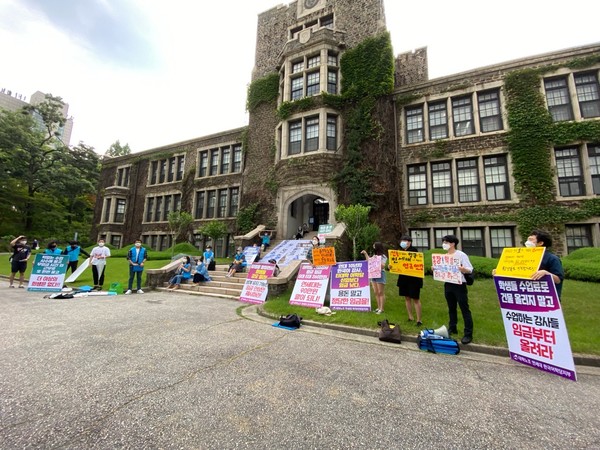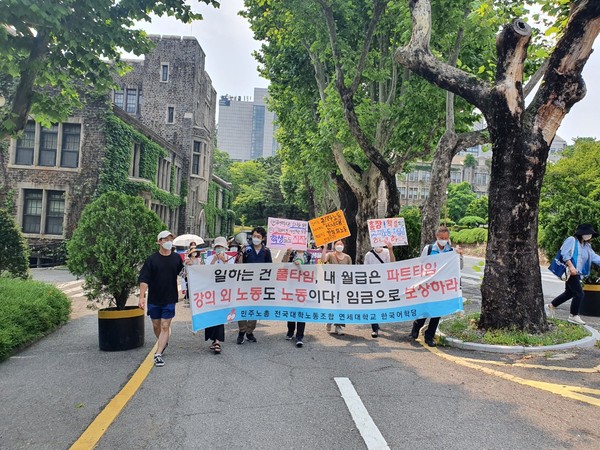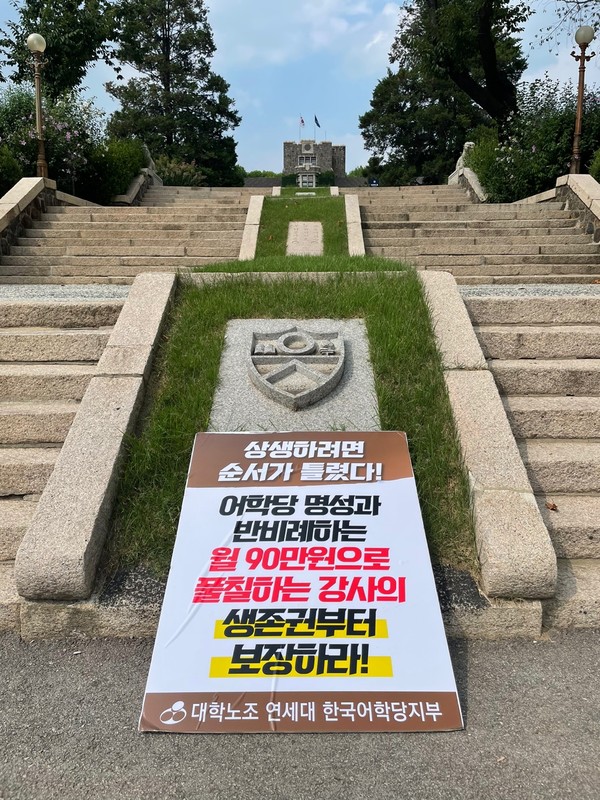Uncovering the Yonsei Korean Language Institute controversy

ON MAY 5, instructors of Yonsei University’s Korean Language Institute (KLI) rallied in front of the main administrative building in protest demanding higher wages and longer working hours. Attempting to draw public attention to the issue, the instructors held up signs stating, “Thirty years of service, annual income of ₩14 million” and “Fair payment, not pocket money.” However, after 20 rounds of negotiations, the instructors and university administration have yet to reach an agreement.
Korean language institutes and COVID-19
Affiliated with the Institute of Language Research and Education (ILRE), Yonsei University’s KLI was founded in 1959. As the nation’s first Korean language institute to provide intensive Korean language courses, the award-winning institution has accepted more than 146,520 foreign students from over 151 countries. It is now the largest Korean language institute in the world, and its success has spurred the formation of similar institutes across the country.
Recently, Korean language institutions have seen a sharp decrease in foreign students due to the COVID-19 pandemic. As a result of the social distancing measures recommended by the Ministry of Education (MOE), almost all Korean language institutes have been conducting their courses online since 2019. While easier to access, remote learning has had a negative impact mainly on enrollment—the MOE reported in its Higher Education Statistics Survey 2020 that there has been a 32.1% decrease in the number of international students entering the country for non-degree courses. Data also showed that universities in Seoul saw more than a 6,000 decrease in the number of foreign students, many of them freshmen enrolled in Korean language institutes. The Korean Language Institute at Incheon National University (Incheon KLI), which once accepted more than 2,000 students per semester, closed down as it received less than 200 students for this year’s autumn semester.
Yonsei University’s KLI has experienced similar impacts—in documents revealed to instructors during negotiations, the university provided papers articulating a 49.8% decrease in enrollment at Yonsei KLI. Instructors added that there were approximately 700 students left in their current classes.
This number includes students from the KLI’s International Campus branch, which was completely shut down at the start of this year due to low enrollment. Only 46 students had enrolled in the sixth semester of the year. All students and affiliated instructors were thus transferred to the Sinchon branch. Alongside the decreasing number of students, the university administration disclosed to its instructors that Yonsei KLI recorded a deficit for the past two years. Yonsei University as a whole, saw a ₩13.6 billion loss, from which non-degree courses such as Yonsei KLI accounted for 34%.

Demands of instructors
Due to the decline of students, Yonsei KLI cut down its number of courses. However, fewer classes have resulted in less income for KLI instructors, whose pay is based on an hourly pay for classes taught. Before the pandemic, Yonsei KLI instructors taught around 30 hours a week, but claim that teaching hours decreased to around 12 hours a week. “While there was some dissatisfaction among instructors towards the Yonsei KLI administration, the declining number of classes was the last straw for us,” said a Yonsei KLI instructor to the press.
In an interview with The Yonsei Annals, Choi Soo-geun (Representative, Yonsei KLI Instructors’ Union) stated that with the beginning of the COVID-19 pandemic, many of Yonsei KLI instructors have found it difficult to make ends meet, pressuring some to take up part-time jobs as food delivery workers to cover expenses. Choi added that there is a clear pay gap between Yonsei KLI and other Korean language institutes. Yonsei KLI instructors earn between ₩27,000 to ₩35,200 per hour for their classes, while Korean language instructors in Seoul National University and Kyung-hee University earn between ₩35,000 to ₩43,000.
In an attempt to resolve these issues, Yonsei KLI instructors began talks with the university administration in October with two main demands—an hourly pay raise of ₩5,000 and a secured minimum lecture time of 20 hours a week. Even with talks in progress, the instructors began placing signs in the university criticizing low pay in addition to holding several on-campus press conferences. In one such press conference on May 18, Yonsei KLI instructors claimed that the university administration’s treatment of them was unfair considering the success the KLI institution has brought to the university.
The instructors claim that the low pay is the result, in part, of the deficit created by the large overhead[1] that Yonsei KLI pays the university. They mentioned Seoul National University’s Korean Language Education Center in comparison, which they claim pays around 10% in overhead. The instructors claim that this financial burden prevents Yonsei KLI from providing better pay for its instructors, and has even pushed Yonsei KLI into further deficit during the pandemic.
One instructor even raised allegations during the August 12 press conference that the university has spent the said royalty to build the Mi-woo building near the East gate of campus, “rather than investing [it] back to the human infrastructure.” Choi added that it was “shameful” that the most well-endowed university in South Korea cannot afford to pay its instructors properly.
In addition to the low pay, instructors bring up the university’s mistreatment and lack of cooperation. According to Choi, the administration currently allocates class hours based on an internal evaluation score. However, instructors have requested for more transparency on how these scores are rated. They claim that the school never provided an in-depth explanation on the calculation process of the scores and made changes to the ways in which the scores were distributed. It was only after the instructors’ extensive inquiry for clarity on the changes that the university administration reverted to its original evaluation method.
Out-of-pay work has been another demand of the instructors. Instructors have expressed dissatisfaction about the absence of pay for the extra work they put in to help foreign students adjust to Korea. In the August 12 conference, instructors stated that they helped resolve language barriers for students by communicating with their apartment landlords or assisting them when they seek part-time jobs. During this press conference, Choi mentioned how the instructors see their willingness to go the extra mile to build rapport with students is “what makes Yonsei KLI one of the best in Korea.”

Key contentions
In response to the grievances put forward by the Yonsei KLI instructors, the university has conducted 20 rounds of negotiations. While the university has refrained from commenting on the protests, instructors claim that the university administration has not compromised on most issues.
In an interview with the Yonsei Chunchu, Yonsei KLI Director Lee Ki-hak (Professor, Department of Psychology) acknowledged claims about low pay stating that “the hourly pay of instructors at Yonsei KLI is not the highest [in the country].” However, Director Lee stated that other factors, such as social insurance, severance pay, and annual leave must also be considered. Yonsei is one of the only universities to grant permanent work status to its KLI instructors.
During the August 12 press conference, Choi agreed that the work status granted work stability to the instructors. However, he added that it was the efforts of the Yonsei KLI Instructors’ Union, not the university’s voluntary will, that enabled the change. Choi also questioned the genuine benefit of permanent work status when decreasing hours meant little income earned. “It is no different than being unemployed,” he added.
The instructors also stated in the August 12 press conference that the university refused to increase their pay as this was the norm for the rest of the university staff. The university has suspended pay increase for all university staff since 2012, when the government capped tuition for all private universities. In documents revealed to the protesting instructors, the university administration revealed that professors at Yonsei KLI saw their income decrease by 8%. As an attempt to find a middle ground, the university proposed a 1.2% increase in the Yonsei KLI instructors’ pay and began paying ₩30,000 per hour for the instructors’ course-related out-of-pay work like recordings for listening tests. Still, a problem that persists is the disproportionate amount of income loss of instructors compared to professors. The instructors maintain that their pay decreased by 32.3%, a number four times larger than professors. The instructors expressed that such a large difference in pay decrease is an unjustifiable burden on the instructors.
As to the instructors’ appeal to use the university’s endowment[2] to increase pay for the Yonsei KLI instructors, the university has not signaled any change to its policy towards endowments since 2018. In response to questions raised by Yoon Eun-hye, a member of the National Assembly, on the high value of Yonsei University’s endowment, Manager Lee Keun-ho of the Office of Planning had stated that “99%” of all current endowment was reserved for other uses before being put into place. He claimed that “36% was reserved for construction, 34% for scholarships, 29% for research and 1% for miscellaneous uses.” To this, the protesting instructors stated in the August 12 press conference that Yonsei KLI is an educational institution, and that the university needs to invest in human infrastructure.
The university has also made clear of its uses for Mi-Woo building. In a statement in April, the university announced that the top six floors of the ten-story building will be used by the Institute of Language Research and Education for teaching and research. Yonsei KLI makes up a large part of the institute. The university’s intentions for the building was made clear when it built a physical bridge connecting the current Yonsei KLI building to Mi-Woo building. Documents obtained by the Annals from Kum-ho Builders also show that the university paid ₩24.3 billion for the construction of the building alone, exceeding the ₩12 billion instructors claim came from their overhead pay. As written in the document, the rest of the bill was footed by the university’s development fund, a pool of donations made by university alumni towards the general development of the university.
At the heart of the dissension lies the gap in the Yonsei administration’s perception of the status of Yonsei KLI instructors. Yonsei KLI instructors maintain that their instructor positions are not part-time, but a full-time job. According to the instructors, the university had never understood their genuine desire for full-time employment. During the August 12 conference, Lee Geun-hae (Instructor, Yonsei KLI) recounted that when the former Yonsei KLI Director was recruiting her, he told her that the job’s short working hours was a key benefit that would allow her to raise her children while making a small income. Lee also stated that when he first joined the KLI, the management told him that this job could not make him a “breadwinner for the family” because it paid so little, but would let him have time to take care of his children at home.
* * *
As of August 11, the protesting Yonsei KLI instructors broke off negotiations with the university administration after a stalemate and are now preparing to apply for arbitration at the National Labor Relations Commission. Once the university fails to come to an agreement with the Yonsei KLI instructors in the Commission hearings, the instructors will gain the legal right to go on an indefinite strike. Referring to an internal vote in 2019 in which 95% of the instructors agreed to an indefinite strike, the instructors warned that they will use this legitimate power to pressure the university. In a telephone call with the Annals, Director Lee stated that the university administration will continue to faithfully engage in talks with the protesting instructors.
[1] Overhead: A royalty fee paid to the university for using its name
[2] University Endowment: Funds that universities receive as donations from organizations or individuals

